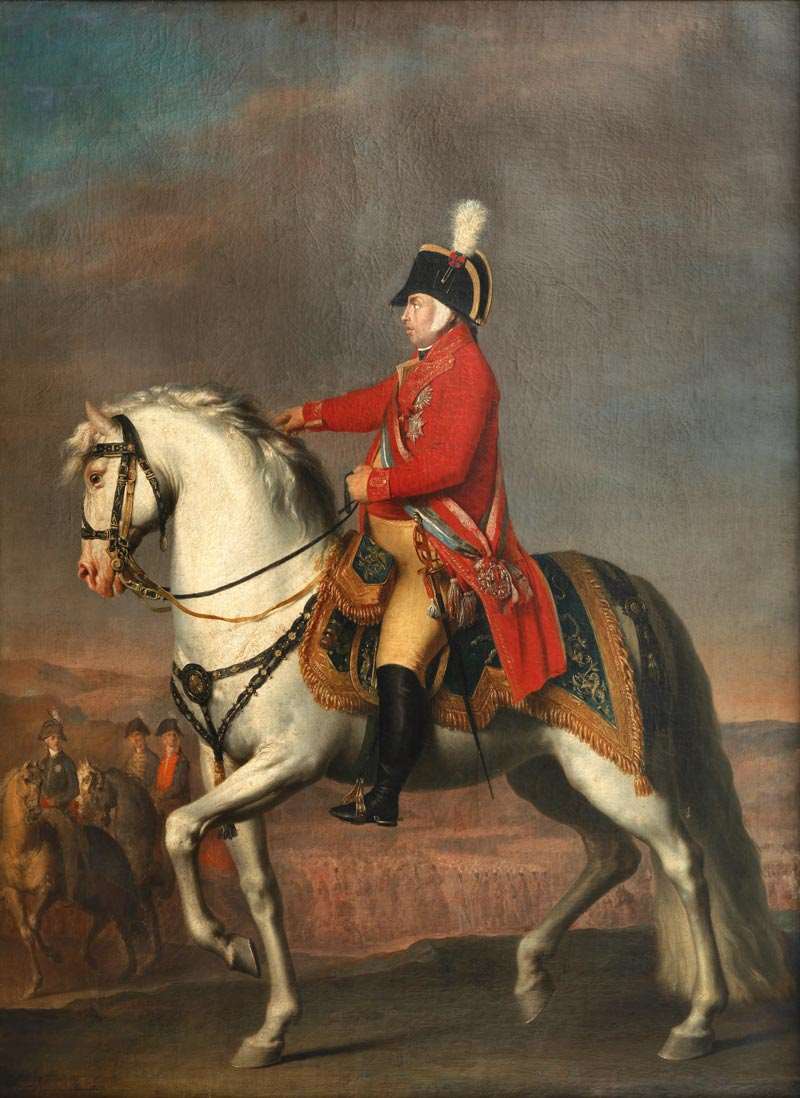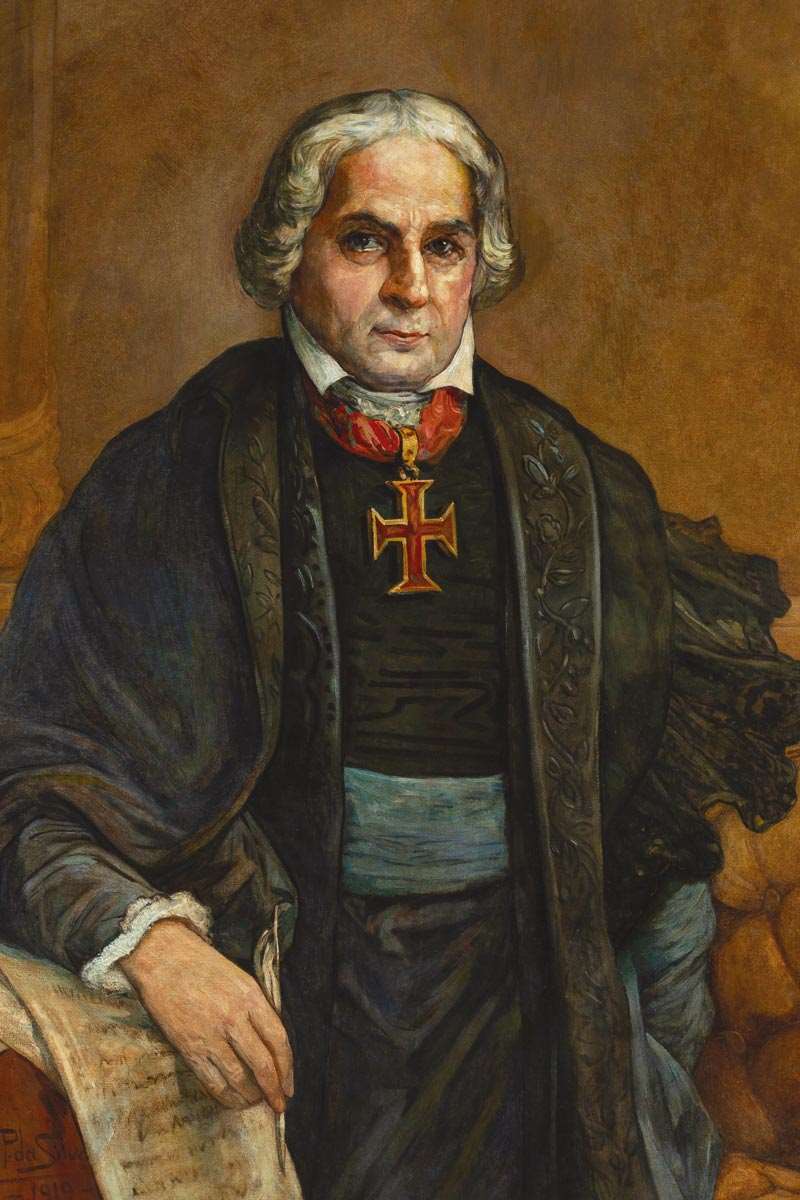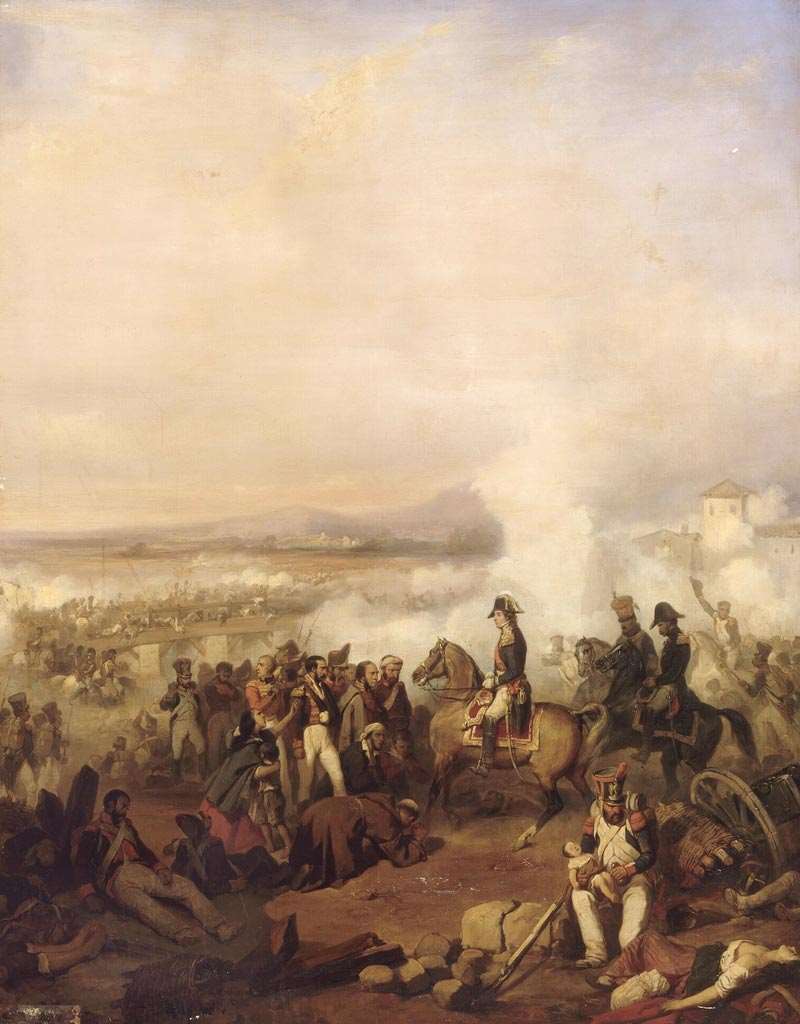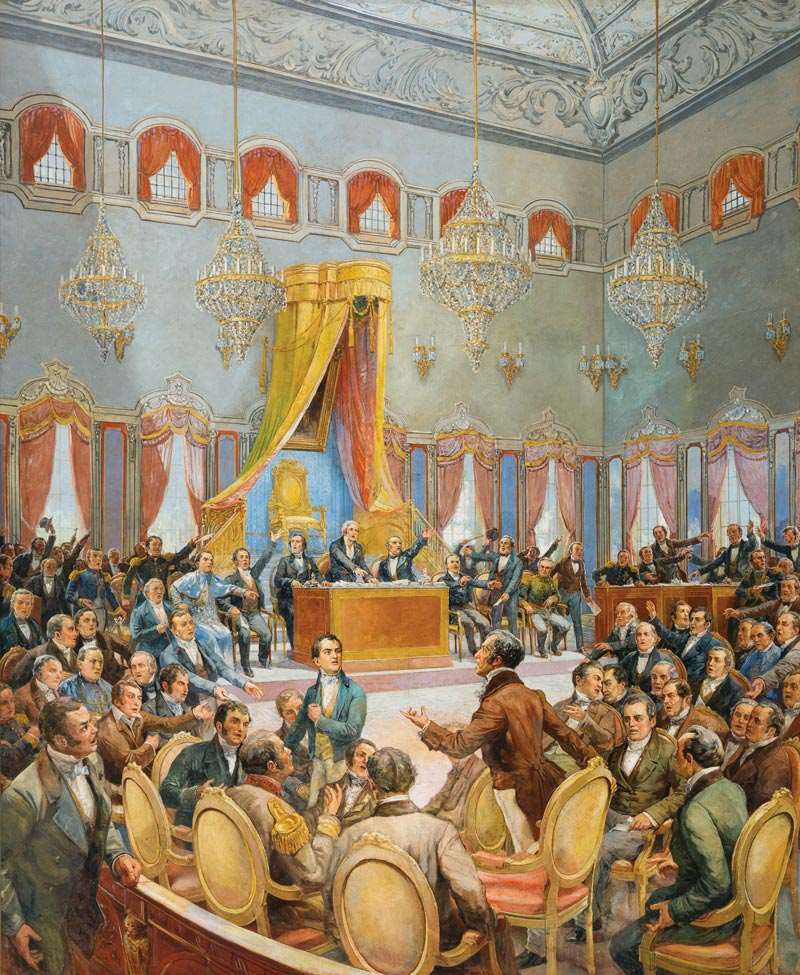
Domingos Sequeira / Wikimedia CommonsDom João VI, King of the Portuguese Empire, in a painting from 1803Domingos Sequeira / Wikimedia Commons
Seen as the leading school of thought behind the transformation of absolutist monarchies into representative states at the time, liberalism was at the base of the political maneuvers made by the main players in Brazil’s independence. In other words, the concepts that emerged in the country were guided by a focus on the individual and the right to property and freedom, reflecting the revolutions that had taken place in Europe and the consequent demand for political systems in which sovereign powers were delimited by constitutions.
In the early nineteenth century, the main political actors in Brazil were supporters of the ideas of the Age of Enlightenment, formulated in the eighteenth century in opposition to the hegemony of the church, arguing that individuals should lead society based on rationality and knowledge. Miriam Dolhnikoff, a historian from the University of São Paulo (USP), says that the liberal ideas promoted at the time were an offshoot of enlightenment, seeking new approaches to economic relations and individual rights. “But it must be emphasized that there was not and still is not any one single liberalism—there are multiple ways of thinking about economics and politics. At that time, some politicians who called themselves liberals defended a constitutional monarchy while others wanted a republican system—which in the nineteenth century was considered radical,” says Dolhnikoff.
The concepts of liberalism that guided those involved in the nation’s independence date back to the French Revolution (1789–1799) and the end of absolute monarchism in France, which was echoed in other monarchical regimes around Europe. After the fall of French Emperor Napoleon Bonaparte (1769–1821) between 1814 and 1815, political debates on the European continent began to revolve around the adoption of constitutions in countries hitherto ruled by absolute monarchies. “At the time, the ideas of theorists such as Henri-Benjamin Constant de Rebecque [1767–1830] and François-René de Chateaubriand [1768–1848] were central to the development of these new regimes,” explains Isabel Lustosa, a sociologist from NOVA University Lisbon.
When the Portuguese Court was transferred to Brazil in 1808, liberalist ideas contributed to increasing criticism of the colonial system, which came to be seen as outdated by leaders such as Dom Rodrigo de Sousa Coutinho (1755–1812), a politician who served under Dom João VI (1767–1826), King of the Portuguese Empire. “Inspired by the Age of Enlightenment, Coutinho saw great economic potential in Portuguese America and advocated for modern reforms supported by scientific knowledge,” says Dolhnikoff, noting that he was director of the Lisbon Academy of Sciences and had a close relationship with José Bonifácio de Andrada e Silva (1763–1838), a naturalist who held several positions in the Portuguese and Brazilian governments. Coutinho believed the monopolies of the colonial system needed to be ended and encouraged the modernization of agriculture through the use of new techniques. “The reforms led by Coutinho after the Portuguese Court’s arrival in Rio de Janeiro were of great interest to the Portuguese-American elites who had not been thinking about independence,” explains Dolhnikoff.

Hélio Nobre & José Rosael / Paulista Museum at USPJosé Bonifácio de Andrada e Silva, who held various positions in the Portuguese and Brazilian governments, painted by Oscar Pereira da Silva (1922)Hélio Nobre & José Rosael / Paulista Museum at USP
In response to the ideas disseminated by the French Revolution and as a result of events such as the independence of the USA in 1776, movements against the absolutist power of monarchs began across Europe. Two that had an impact in the Americas took place in 1820: the Cádiz Revolution in Spain and the Revolution of Porto in Portugal.
“The ideological principles held by those involved in these rebellions was that man, and not God, constituted a fundamental value of politics. Until then, the basis of many governments was theology, but the change meant this position would instead be occupied by citizens,” says Zília Osório Castro, a historian from NOVA University Lisbon. It was at this moment, she points out, that contemporary constitutionalism emerged. “In the Revolution of Porto, for example, the rebels—known as vintistas—shouted: ‘Constitution or death!’ Victorious, the first measure they took in 1821 was to draft a constitution, which had a major impact on Portuguese life in the nineteenth century,” says Castro.
She points out, however, that although the vintistas supported parliamentary sovereignty and not the king, they combined reformist ideas with traditional values. They supported maintenance of the monarchy in Portugal, for example, rather than a change to a republican system, as happened in France in 1792. “The aim of the Revolution of Porto was to end the privileges of the nobility and the constitution was the way to achieve it,” explains the historian. With the establishment of the Lisbon Courts and parliament taking over government of the Portuguese Empire in January 1821, a fundamental feature of Portugal’s political life disappeared: the sovereignty of the monarch. Castro believes that replacing royalty with parliament had a revolutionary impact in the political context of the Portuguese Empire.
Dolhnikoff from USP explains that the Revolution of Porto supported political liberalism—by maintaining that the monarchy should be representative—and economic liberalism, which calls for less government interference in the economy. “A new type of relationship was established between the state and the population. Instead of subjects, people started to be seen as citizens with the right to come and go and to own property,” she says. According to her, after the Revolution of Porto, the ideas of enlightenment and liberalism began to spread in Brazil. “The elites started using these theoretical concepts to interpret local conditions and defend their interests,” says Marisa Saenz Leme, a historian from São Paulo State University (UNESP), Franca campus. An example of ideas circulating at the time were those of British philosopher and economist Adam Smith (1723–1790), who argued for valuing individuals and limiting the role of the state.

Joseph Beaume / Wikimedia CommonsPainting by French artist Joseph Beaume shows rebels from the Liberal Revolution of Porto, which took place in 1820Joseph Beaume / Wikimedia Commons
Luso-Brazilians and Portuguese who lived in Brazil, such as Bonifácio, thus began participating in the court. “Influenced by the enlightenment and reformist ideas of the University of Coimbra, this group was politically conservative and backed the modernization of the monarchy, but not the establishment of a constitution that would delimit the monarch’s powers too much in relation to the legislature,” explains historian Jorge Vinícius Monteiro Vianna, who defended his PhD on the subject at the Federal University of Espírito Santo (UFES) in 2019. In opposition to the court, another group was formed by journalist and politician Joaquim Gonçalves Ledo (1781–1847), linked to internal commerce in Rio de Janeiro and with no academic ties to the University of Coimbra. “They were critical of absolutism and supported the idea of liberalism, expressing ideas of modern contractualism, according to which the state should function as an institution contracted to manage public and individual interests,” explains Vianna, who says the group’s proposals were considered “dangerous” by politicians linked to Bonifácio because they could give rise to expansion of the notion of popular sovereignty. “The Coimbrão group, as it was known, wanted the state to be a vector for the modernization of society. They were two opposing forces,” says the historian.
In early 1822, another significant debate developed in Portuguese parliament regarding the distinction in nationalities. In Brazil, people considered themselves Portuguese from South America and began demanding equal rights to Portuguese people in Portugal. From this perspective, the constitution would uniformly benefit the entire Portuguese Empire, something that did not please the elites in Portugal. “Disagreements erupted around what should have been the center of the Empire,” says Castro. Due to the fallout, politicians associated with Ledo began to pressure Dom Pedro I (1798–1834) to establish a legislative assembly in Brazil that would be able to pass its own laws to the benefit of the local elites. “Because there was already an assembly in Portugal, the Portuguese recognized this event as the first sign of a fracture,” continues the NOVA University Lisbon historian. According to the researcher, the idea of being Brazilian began to take shape in the following months.
Despite the Coimbrão and Ledo groups momentarily joining forces in January 1822 to pressure Dom Pedro I to remain in Brazil rather than returning to Portugal as the Portuguese elites wanted, their disagreements worsened over the following months. Ledo’s group began to be considered republicans, which was synonymous with radicalism and angered public opinion. Persecuted and stifled by Dom Pedro I, it was not long before the group was disbanded. When Brazil’s independence was declared, it thus fell to politicians linked to Coimbra to form the new government. “For a long time, historians studying the period interpreted liberalism as incompatible with slavery, viewing it as merely an exercise in rhetoric. Today, however, it is understood that a slave-owning branch of liberalism was created both in Brazil and in the USA,” says Dolhnikoff. There is evidence of this, she says, in the fact that liberal economic ideals were even adopted in slavery, with the elites arguing that a free market had to be guaranteed in the slave trade.

Hélio Nobre & José Rosael / Paulista Museum at USPSessão das Cortes de Lisboa (Lisbon courts in session), painted by Brazilian artist Oscar Pereira da Silva in 1922Hélio Nobre & José Rosael / Paulista Museum at USP
Schools of thought
The political ideas surrounding Brazil’s independence were subject to different lines of interpretation that have repercussions in the fields of history and sociology to this day. In harmony with the official reflections developed by the Brazilian Historic and Geographic Institute (IHGB) in the nineteenth century, one of these interpreters was the Viscount of Porto Seguro Francisco Adolfo de Varnhagen (1816–1878), who was a historian, military official, and diplomat. In his pioneering assessment, the independence of Brazil had a sense of continuity, given the Portuguese origin of the local imperial family. His perspective was based on the notion that Brazilian territorial unity was guaranteed even before emancipation and was based on the idea of a union between the three races (white, black, and indigenous) that lived there.
While sharing the idea that Brazil’s independence was a natural process and not a rupture, scholars from other schools of thought did not believe that territorial unity was granted in advance. One of the exponents of this interpretation was the jurist and historian Francisco José de Oliveira Vianna (1883–1951), who argued in the 1920s that Brazilian society had tended towards fragmentation and that only a strong state could ensure the country’s territorial unity. “From this perspective, the crown was seen as a fundamental external element to guarantee national unity,” explains Bernardo Ricupero, a political scientist at USP and current director of the Center for Studies of Contemporary Culture (CEDEC).
In the 1950s, another jurist, Raymundo Faoro (1925–2003), challenged this analysis, claiming that Brazil’s cohesion was never reliant on a strong state. “For Faoro, on the contrary, the state was an oppressor of society,” says Ricupero. Finally, he mentions the more recent interpretations of historian Caio Prado Junior (1907–1990) and sociologist Florestan Fernandes (1920–1995). Both believed that independence provided political emancipation but ended up creating a state that preserved the economic and social structures of the colonial era. “Florestan Fernandes and Caio Prado considered Brazil’s independence a revolution but claimed that the subsequent political process functioned as an amalgamation of the new and the old,” concludes the political scientist.
Projects
1. Regional dimensions and sociopolitical profiles in the conceptions of sovereignty in Brazil during the 1st Reign: The issue of fiscal and military controls (nº 17/02845-9); Grant Mechanism Regular Research Grant; Principal Investigator Marisa Saenz Leme (UNESP); Investment R$26,800.
2. Representative government and electoral legislation in nineteenth century Brazil (nº 13/08217-9); Grant Mechanism Regular Research Grant; Principal Investigator Miriam Dolhnikoff (USP); Investment R$74,417.09.
Journal
LUSTOSA, I. & VARGUES, I. (orgs.). Revista História das Ideias – Imprensa, Independência e Constituição. Vol. 40, 2nd series, 2022.
Book
DOLHNIKOFF, M. José Bonifácio: O patriarca vencido. São Paulo: Companhia das Letras, 2012.